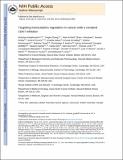Targeting transcription regulation in cancer with a covalent CDK7 inhibitor
Author(s)
Kwiatkowski, Nicholas P.; Zhang, Tinghu; Rahl, Peter B.; Abraham, Brian J.; Reddy, Jessica; Ficarro, Scott B.; Dastur, Anahita; Amzallag, Arnaud; Ramaswamy, Sridhar; Tesar, Bethany; Jenkins, Catherine E.; Hannett, Nancy M.; McMillin, Douglas; Sanda, Takaomi; Sim, Taebo; Kim, Nam Doo; Look, A. Thomas; Mitsiades, Constantine S.; Weng, Andrew P.; Brown, Jennifer R.; Benes, Cyril H.; Marto, Jarrod A.; Young, Richard A.; Gray, Nathanael S.; ... Show more Show less
DownloadYoung_Targeting transcription.pdf (4.383Mb)
PUBLISHER_POLICY
Publisher Policy
Article is made available in accordance with the publisher's policy and may be subject to US copyright law. Please refer to the publisher's site for terms of use.
Terms of use
Metadata
Show full item recordAbstract
Tumour oncogenes include transcription factors that co-opt the general transcriptional machinery to sustain the oncogenic state, but direct pharmacological inhibition of transcription factors has so far proven difficult. However, the transcriptional machinery contains various enzymatic cofactors that can be targeted for the development of new therapeutic candidates, including cyclin-dependent kinases (CDKs). Here we present the discovery and characterization of a covalent CDK7 inhibitor, THZ1, which has the unprecedented ability to target a remote cysteine residue located outside of the canonical kinase domain, providing an unanticipated means of achieving selectivity for CDK7. Cancer cell-line profiling indicates that a subset of cancer cell lines, including human T-cell acute lymphoblastic leukaemia (T-ALL), have exceptional sensitivity to THZ1. Genome-wide analysis in Jurkat T-ALL cells shows that THZ1 disproportionally affects transcription of RUNX1 and suggests that sensitivity to THZ1 may be due to vulnerability conferred by the RUNX1 super-enhancer and the key role of RUNX1 in the core transcriptional regulatory circuitry of these tumour cells. Pharmacological modulation of CDK7 kinase activity may thus provide an approach to identify and treat tumour types that are dependent on transcription for maintenance of the oncogenic state.
Date issued
2014-06Department
Massachusetts Institute of Technology. Department of Biology; Whitehead Institute for Biomedical ResearchJournal
Nature
Publisher
Nature Publishing Group
Citation
Kwiatkowski, Nicholas, Tinghu Zhang, Peter B. Rahl, Brian J. Abraham, Jessica Reddy, Scott B. Ficarro, Anahita Dastur, et al. “Targeting Transcription Regulation in Cancer with a Covalent CDK7 Inhibitor.” Nature 511, no. 7511 (June 22, 2014): 616–620.
Version: Author's final manuscript
ISSN
0028-0836
1476-4687